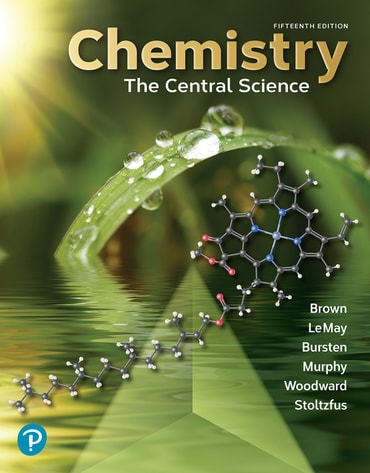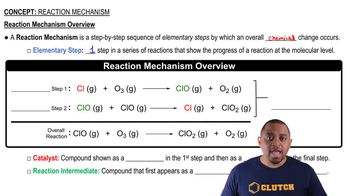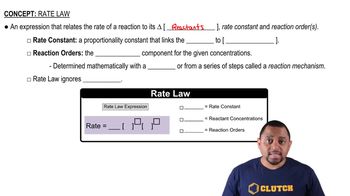The gas-phase decomposition of ozone is thought to occur by the following two-step mechanism.
Step 1: O3(g) ⇌ O2(g) + O(g) (fast)
Step 2: O(g) + O3(g) → 2 O2 (slow)
(a) Write the balanced equation for the overall reaction.

 Verified step by step guidance
Verified step by step guidance



The gas-phase decomposition of ozone is thought to occur by the following two-step mechanism.
Step 1: O3(g) ⇌ O2(g) + O(g) (fast)
Step 2: O(g) + O3(g) → 2 O2 (slow)
(a) Write the balanced equation for the overall reaction.
The gas-phase decomposition of ozone is thought to occur by the following two-step mechanism.
Step 1: O3(g) ⇌ O2(g) + O(g) (fast)
Step 2: O(g) + O3(g) → 2 O2 (slow)
(b) Derive the rate law that is consistent with this mechanism. (Hint: The product appears in the rate law.)
The gas-phase decomposition of ozone is thought to occur by the following two-step mechanism.
Step 1: O3(g) ⇌ O2(g) + O(g) (fast)
Step 2: O(g) + O3(g) → 2 O2 (slow)
(d) If instead the reaction occurred in a single step, would the rate law change? If so, what would it be?
In a hydrocarbon solution, the gold compound (CH3)3AuPH3 decomposes into ethane (C2H6) and a different gold compound, (CH3)AuPH3. The following mechanism has been proposed for the decomposition of (CH3)3AuPH3:
Step 1: (CH3)3AuPH3 k1⇌k-1 (CH3)3Au + PH3 (fast)
Step 2: (CH3)3Au k2→ C2H6 + (CH3)Au (slow)
Step 3: (CH3)Au + PH3 k3→ (CH3)AuPH3 (fast)
(a) What is the overall reaction?
(b) What are the intermediates in the mechanism?
In a hydrocarbon solution, the gold compound (CH3)3AuPH3 decomposes into ethane (C2H6) and a different gold compound, (CH3)AuPH3. The following mechanism has been proposed for the decomposition of (CH3)3AuPH3:
Step 1: (CH3)3AuPH3 k1⇌k-1 (CH3)3Au + PH3 (fast)
Step 2: (CH3)3Au k2→ C2H6 + (CH3)Au (slow)
Step 3: (CH3)Au + PH3 k3→ (CH3)AuPH3 (fast)
(c) What is the molecularity of each of the elementary steps?